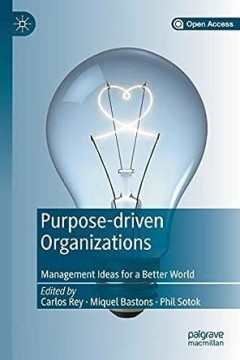Filter by

Purpose-driven Organizations : Management Ideas for a Better World
A higher purpose is not simply about profit. Symbolising the motivations of our actions and efforts, it reflects something much more aspirational and contributes to our global society. This open access book offers novel solutions to ensure employees support a wider organizational meaning whilst guaranteeing that the company benefits from the employee’s individual sense of purpose. Advocat…
- Edition
- 1
- ISBN/ISSN
- 9783030176747
- Collation
- XXI, 138 hlm; ill., lamp.,
- Series Title
- -
- Call Number
- -

Built on Value: The Huawei Philosophy of Finance Management
This book presents the concept of value as the central component to success and longevity of the global ICT industry player, Huawei. It provides examples of how Huawei focuses on customers to pursue sustainable and profitable growth rather than focusing on capital market valuation which is a familiar scenario among Western companies. It is the business departments that are the creators of valu…
- Edition
- 1
- ISBN/ISSN
- 9789811375071
- Collation
- XXXVI, 456 hlm; ill., lamp.,
- Series Title
- -
- Call Number
- -

Resilient Governance of Urban Redevelopment : State, Market and Communities i…
To examine the origins, characteristics, and outcomes of resilient governance with Chinese characteristics, this open access book takes Guangzhou, a typical Chinese city from 1990 to 2015, as an example. Through participant observation, semi-structured interviews, and the collection of secondary data, this book finds that (1) the institutional context can be described as an authoritarian land-o…
- Edition
- -
- ISBN/ISSN
- 978-981-99-2928-3
- Collation
- X, 77
- Series Title
- SpringerBriefs in Geography (BRIEFSGEOGRAPHY)
- Call Number
- -

Urban and Regional Cooperation and Development : Challenges and Strategies fo…
This is an open access book. This book, first of all, introduces the new unveiled Guangdong-Macao Intensive Cooperation Zone with details as a special mode of the regional collaborative development that is committed to be mutually beneficial to both sides with different political and economic systems. China's central authorities have recently issued a masterplan for constructing the Guangdong-M…
- Edition
- -
- ISBN/ISSN
- 978-981-19-8061-9
- Collation
- IX, 94
- Series Title
- SpringerBriefs in Geography (BRIEFSGEOGRAPHY)
- Call Number
- -

Smart Cities in Asia : Regulations, Problems, and Development
This open access book examines different aspects of smart cities, including technology, urban development, sustainable development, finance, and privacy and data protection. It also covers a wide range of jurisdictions in Asia-Pacific: Hong Kong, Indonesia, Malaysia, Singapore, Thailand, and Vietnam. The book consists of two main parts. The first part includes general chapters that conceptualiz…
- Edition
- -
- ISBN/ISSN
- 978-981-19-1701-1
- Collation
- IX, 124
- Series Title
- SpringerBriefs in Geography (BRIEFSGEOGRAPHY)
- Call Number
- -

Richter über internationale Gerichte? : Die Rolle innerstaatlicher Gerichte …
Das Open-Access-Buch untersucht am Beispiel des Europäischen Gerichtshofs für Menschenrechte (EGMR) und des Interamerikanischen Menschenrechtsgerichtshofs (IAGMR), welche Rolle innerstaatliche Gerichte bei der Umsetzung internationaler Entscheidungen wahrnehmen. Wann sind sie bereit ihre Pendants in Straßburg bzw. San José bei der Umsetzung ihrer Entscheidungen zu unterstützen und diese gl…
- Edition
- -
- ISBN/ISSN
- 9783662611760
- Collation
- -
- Series Title
- 292
- Call Number
- -

Subsidiaritätsgrundsatz und Tatsachenfeststellung unter der Europäischen Me…
Dieses Buch ist eine Open-Access-Publikation unter einer CC BY 4.0 Lizenz. Subsidiarität ist zu einem Schlüsselbegriff des Diskurses um die Europäische Menschenrechtskonvention (EMRK) geworden. Neben seiner vielbeachteten materiell-rechtlichen Funktion kommt dem Begriff auch eine verfahrensrechtliche Tragweite zu. Das vorliegende Buch widmet sich dieser prozessualen Dimension des Sub…
- Edition
- -
- ISBN/ISSN
- 9783662588871
- Collation
- XVI, 188
- Series Title
- 283
- Call Number
- -

Qualitative Freedom - Autonomy in Cosmopolitan Responsibility
In the light of growing political and religious fundamentalism, this open access book defends the idea of freedom as paramount for the attempt to find common ethical ground in the age of globality. The book sets out to examine as yet unexhausted ways to boost the resilience of the principle of liberalism. Critically reviewing the last 200 years of the philosophy of freedom, it revises the princ…
- Edition
- 1
- ISBN/ISSN
- 9783030047238
- Collation
- X, 365 hlm,: ill, lamp;
- Series Title
- -
- Call Number
- -

Musical Haptics
This open access book offers an original interdisciplinary overview of the role of haptic feedback in musical interaction. Divided into two parts, part I examines the tactile aspects of music performance and perception, discussing how they affect user experience and performance in terms of usability, functionality and perceived quality of musical instruments. Part II presents engineering, compu…
- Edition
- -
- ISBN/ISSN
- 978-3-319-58316-7
- Collation
- XV, 285
- Series Title
- Springer Series on Touch and Haptic Systems (SSTHS)
- Call Number
- 001 MUS

Visualization of Time-Oriented Data
This is an open access book. Time is an exceptional dimension with high relevance in medicine, engineering, business, science, biography, history, planning, or project management. Understanding time-oriented data via visual representations enables us to learn from the past in order to predict, plan, and build the future. This second edition builds upon the great success of the first editi…
- Edition
- -
- ISBN/ISSN
- 9781447175278
- Collation
- XIX, 441
- Series Title
- -
- Call Number
- -
 Computer Science, Information & General Works
Computer Science, Information & General Works  Philosophy & Psychology
Philosophy & Psychology  Religion
Religion  Social Sciences
Social Sciences  Language
Language  Pure Science
Pure Science  Applied Sciences
Applied Sciences  Art & Recreation
Art & Recreation  Literature
Literature  History & Geography
History & Geography